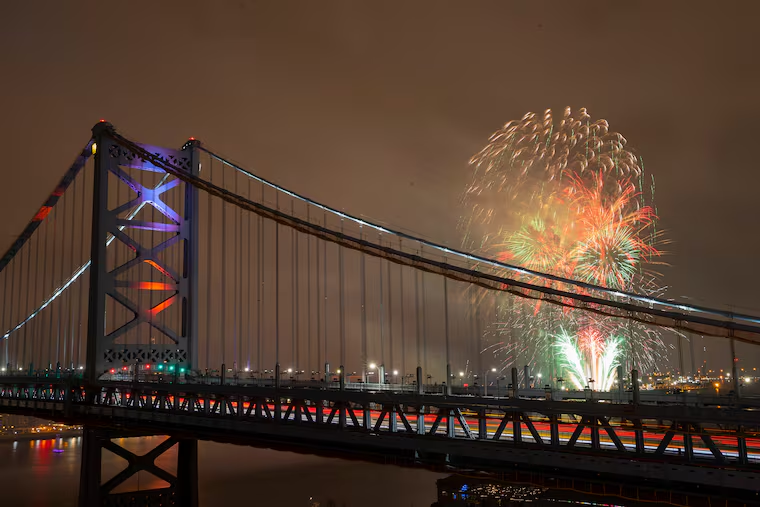Philly is getting shorter, more frequent heat waves. This summer’s first could start Thursday.
Philly has been mostly spared of prolonged heat waves in recent years, and heat deaths are down. Weather for the Fourth is looking good.

While Philadelphia is having a shot at its first heat wave of 2022 starting Thursday, forecasters assure it won’t survive a holiday weekend that should be at least half-decent — and even be kind to the fireworks shows and their admirers.
The official temperature in Philly reached 90 degrees Thursday, with a code-orange alert for ozone in effect, and is expected to crest well into the 90s on Friday. It might make it to 90 again on Saturday, but steamy air and picnic-threatening showers could put a cap on afternoon temperatures.
And with a page about to fall off the calendar, entering July nothing like the heat that has baked parts of Europe, Japan, and the American West this season is in the Philadelphia region’s near future.
» READ MORE: Forecasters are seeing yet another hotter-than-normal summer for Philly
“We haven’t had any sustained heat,” said Jonathan O’Brien, meteorologist at the National Weather Service’s Mount Holly office.
All this could change before July is over, but what hasn’t happened so far this year speaks to a paradoxical trend — a lack of prolonged hot spells even as summers are getting hotter in the era of accelerating warming and climate change.
It’s possible that a public nemesis commonly called “humidity” has had a hand in dampening the daytime heat in recent summers, said Dave Dombek, senior meteorologist with AccuWeather Inc.
» READ MORE: Philly’s summer temps have risen 3 degrees since 1970 — and nights have gotten even warmer
Whatever the reason, the trend could help explain why heat-related deaths have been on the decline in Philadelphia.
In the last 10 years, Philadelphia has reported 44 heat-related deaths total. In the 10-year period ending in 2002, it recorded nearly 400, according to Public Health Department figures.
Philly and heat waves
NOAA, the CDC, and health experts have praised Philadelphia’s aggressive heat-wave response system that it initiated in 1995, two summers after its deadliest summer on record, with 118 heat-related fatalities.
When the National Weather Service and the health department declare a heat emergency — not expected to happen this week — cooling centers are opened, and the Philadelphia Corporation for Aging extends its “helpline” hours. In addition, block captains are urged to look in on the elderly who live alone, of which the city has about 150,000, according to Census figures.
Philadelphia pioneered the method for counting heat-related mortality by including cases in which heat was a contributing cause — as opposed to solely counting confirmed hyperthermia cases, a core body temperature of 105 Fahrenheit.
» READ MORE: For one day, Philly residents will take to sweltering streets to measure heat and pollution
Since it would be impossible to get to all victims in time to confirm hyperthermia, the city’s then-medical examiner ordered staff to look for forensic clues such as fans operating in a room with closed windows.
NOAA and the CDC recommended that other cities adopt Philadelphia’s strategies, and health experts have credited the city with raising awareness of heat’s potentially deadly hazards and saving people’s lives.
Something in the air
But at least lately, the data suggest that Philly has been getting help from the atmosphere in reducing the heat-mortality numbers.
In the summers of 1993, 1995, and 1999, the city recorded 266 total heat-related deaths. All three of those years were characterized by long, punishing heat waves. The longest one, in 1995, went on for 17 days.
In the last 10 years, the longest spell of consecutive days with 90-degree or higher temperatures was 10, in 2012.
» READ MORE: Summers are hotter, but heat-related deaths have dropped. Philadelphia has a lot do with that.
Conversely, the last 10 years have produced a harvest of hot spells that lasted just three to five days, with more than three on average and five last year. No other 10-year period in records dating to 1874 has produced as many of those short-term heat waves. On average, prior to 2012, they had occurred a shade less than twice annually.
That might have to do with more moisture being in the air and on the ground, said Dombek. Rain has a way of begetting rain.
Summers generally have been wet around here — as has been June, with over 5 inches of rain in Philly — and the region hasn’t had a serious drought in 20 years. That could well be related to the global warming trend; warmer air can hold more water vapor.
“It seems like every time you do get a short-term drought it gets knocked back, and sometimes big time,” Dombek said.
“If the ground is wetter than normal, it’s not going to get as hot,” he said. The more energy the sun spends on evaporating puddles and zapping water droplets from the leaves, the less energy it has left to cook the surface.
Moving Fourth
The sun likely will have more water to evaporate Saturday, but chances are that most of Sunday will be dry, and perhaps all of Monday, said the weather service’s O’Brien, with temperatures both days topping out in the 80s.
“Monday is looking like the pick of the holiday weekend at this point,” he said, and as for watching the bombs bursting in air, the fireworks outlook is “looking good.”